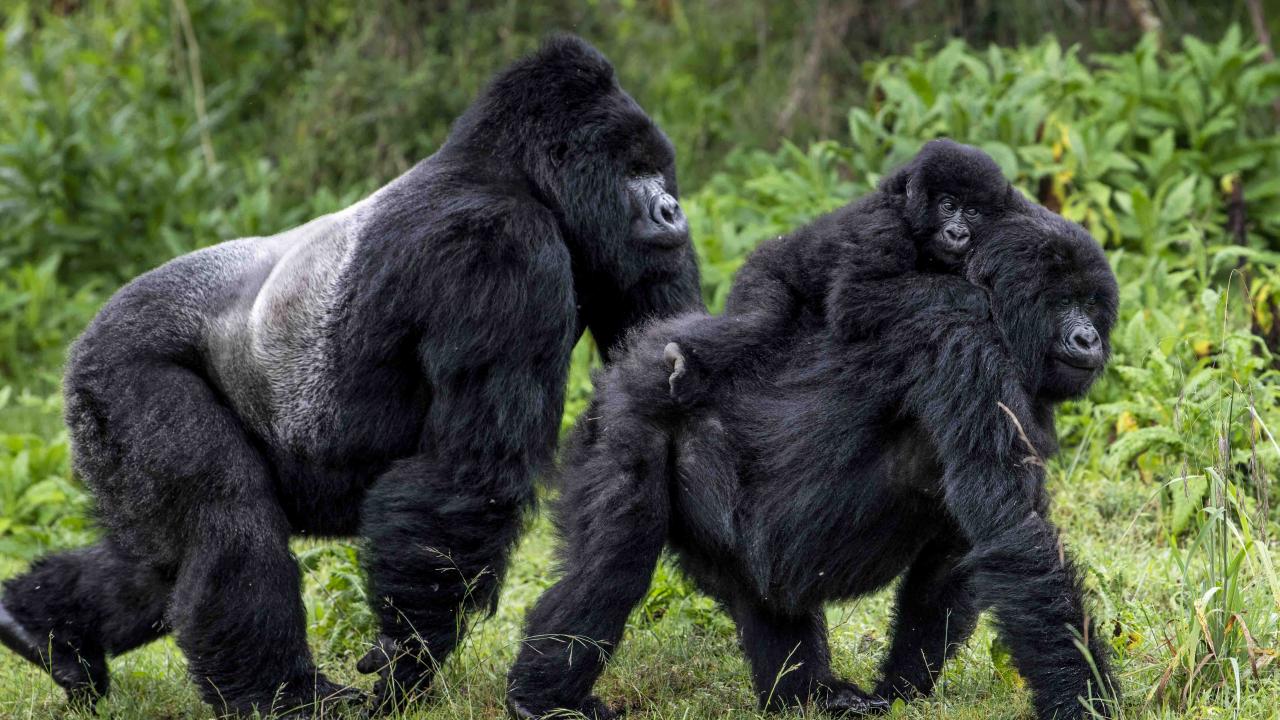
Gorillas and chimpanzees are two of Africa’s most captivating great apes. Gorillas Vs Chimpanzees share close genetic ties with humans, yet they differ remarkably in their physical traits, behaviors, social systems, and habitats. Understanding these similarities and differences gives wildlife lovers and researchers a deeper appreciation of these incredible primates.
Physical Differences Between Gorillas Vs Chimpanzees
Gorillas are the largest of all primates. Adult males, known as silverbacks, weigh between 140–200 kilograms, while females range from 70–90 kilograms. Their broad chests, muscular arms, and robust bodies are built for strength rather than speed. Gorillas primarily move by knuckle-walking and spend most of their lives on the ground.
Chimpanzees, in contrast, are smaller and more agile. Males weigh about 40–70 kilograms and females 30–50 kilograms. Their long arms and lighter builds make them excellent climbers and swingers. Although they can also move on the ground, chimpanzees are more arboreal and far quicker and more dexterous than gorillas.
Behavioral Differences
Gorillas are generally peaceful and gentle. Each group is led by a dominant silverback who protects the family, mediates conflicts, and makes decisions. They are mainly herbivores, feeding on leaves, stems, fruits, and bark. Communication is mostly nonverbal, with chest-beating, grunts, and roars used to express dominance or alert others.
Chimpanzees, on the other hand, are lively, intelligent, and social. They are omnivorous, feeding on fruits, insects, leaves, and occasionally small animals. Known for their tool use, chimpanzees use sticks to fish for termites and stones to crack nuts. They are more aggressive and territorial than gorillas, often displaying dominance through group displays or vocal outbursts.
Social Structure
Gorillas live in small, stable family units led by one dominant silverback, along with several females and their offspring. The group is close-knit, and members rarely move between families.
Chimpanzees live in larger, more flexible communities known as fission-fusion societies. These groups constantly split and merge depending on food availability and social relationships. Females often leave their birth groups, while males stay to form alliances and maintain dominance hierarchies. This dynamic structure encourages cooperation, social grooming, and intricate communication.
Habitat and Distribution
Gorillas inhabit the tropical forests of Central Africa. Mountain gorillas live in the Virunga Volcanoes and Bwindi Impenetrable Forest, while lowland gorillas are found in the rainforests of the Congo Basin. Their dense forest homes provide abundant vegetation to support their plant-based diet.
Chimpanzees are more widely distributed across equatorial Africa, from Uganda and Rwanda to West Africa. They thrive in diverse environments, including forests, woodlands, and savanna-forest regions. Their adaptability allows them to survive in a wider range of habitats than gorillas.
Similarities Between Gorillas Vs Chimpanzees
Despite their differences, gorillas and chimpanzees share many traits:
-
Both are great apes sharing over 98% of their DNA with humans.
-
They are highly intelligent and capable of learning, problem-solving, and using tools.
-
Each species lives in complex social groups with hierarchies and relationships.
-
Both face major threats such as habitat loss, poaching, and diseases.
-
Conservation initiatives and protected areas play crucial roles in their survival.
Conclusion
Gorillas and chimpanzees are among the world’s most remarkable primates, showcasing the strength, intelligence, and diversity of Africa’s wildlife. Gorillas embody calm power and strong family bonds, while chimpanzees display curiosity, agility, and social sophistication. Both species remind us of the deep connection between humans and the animal kingdom.
For travelers eager to experience these magnificent great apes in their natural habitats, Muganzi Safaris offers unforgettable gorilla and chimpanzee trekking tours in Uganda and Rwanda.
Book your adventure today and witness the wonders of Africa’s primates responsibly and safely.



